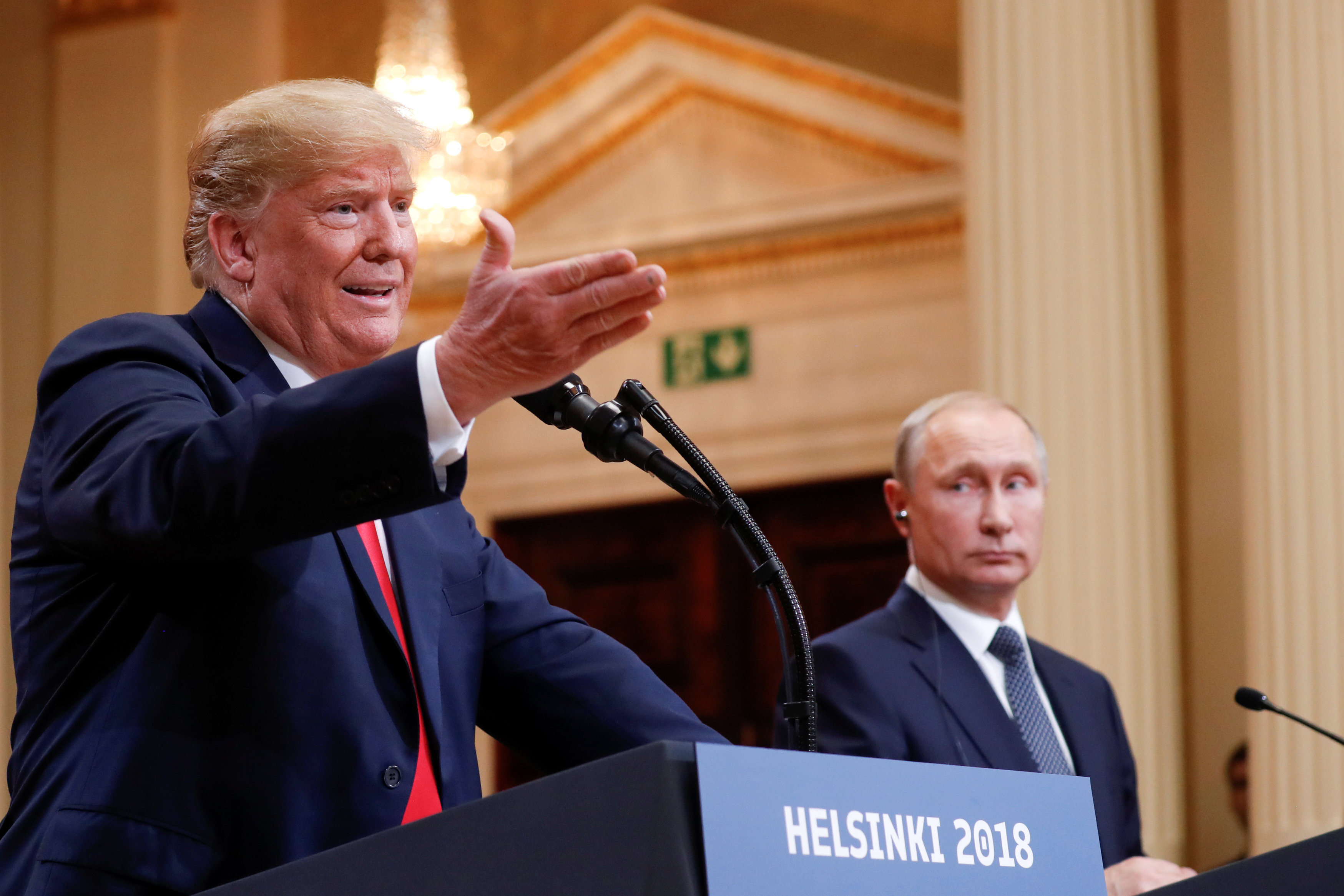 REUTERS/Kevin Lamarque
REUTERS/Kevin Lamarque On July 16, President Donald Trump gave a deeply disgraceful press conference with Russian dictator Vladimir Putin. The presser began with Trump announcing that although the Russia-United States relationship has “never been worse than it is now,” all of that “changed as of about four hours ago.” It was downhill from there. Trump proceeded to state that he held “both countries responsible” for the deterioration of the relationship, then supported Putin’s argument that Russia hadn’t interfered in the 2016 American election in any way: “I have President Putin, he just said it’s not Russia. I will say this: I don’t see any reason why it would be. … I have confidence in both parties.”
Both parties. One party being a murderous dictator, and the other the intelligence community that works for him.
All of which is disgusting, of course.
That doesn’t mean, as Democrats have suggested, that Trump is in bed with the Russians. Far more likely, it means that Trump’s ego is one giant gaping wound, constantly draining rage over the suggestion that his election victory was somehow ill-won. To the refusal of former FBI Director James Comey to publicly clear him in the collusion investigation, Trump responded by firing Comey; now he’s responded to the Robert Mueller investigation’s indictment of 12 Russian government hackers by proclaiming that Putin might be innocent after all. This isn’t about some nefarious plot. It’s about Trump’s ridiculous ego problem.
None of that acts as justification for Trump’s behavior, of course.
But it does explain why when Trump says stuff, it often doesn’t matter.
More than a year ago, I wrote that Americans were beginning to tune out Trump. “Many Americans have been treating Trump as a guy to ignore except when he bothers them, an approach that seems pretty reasonable at this point,” I suggested. But could Trump’s rhetoric make a difference with regard to foreign policy? Over at The New Republic, Jeet Heer criticized the idea that it couldn’t, stating that “the very nature of our modern world, and the United States’ supremacy, makes it impossible to dismiss an American president’s word.”
The rest of the world has already dismissed Trump’s verbiage on various occasions.
But that’s obviously untrue. The rest of the world has already dismissed Trump’s verbiage on various occasions. For example, according to The Wall Street Journal, he told NATO members that he would “do my own thing” if their countries didn’t increase their military spending. What was the upshot? Nothing. NATO leaders quickly closed ranks and stated that NATO was as strong as ever, ignoring Trump’s pyrotechnics. They figured, correctly, that Trump’s national security establishment would not facilitate a pullout from NATO; and that if they gave him some sort of rhetorical victory, he’d go back to watching “Shark Week.”
When it comes to trade, however, Trump’s words matter — because they’re backed by policy. Trump’s tantrum at the G-7 had real ramifications for American policy because he immediately used his executive power to launch tariffs at a bevy of American allies.
So, is Trump’s Russia policy more like NATO or more like the G-7? Putin probably figures it’s more like NATO: If he were to suddenly invade Lithuania, Trump couldn’t be trusted to stand down. And were Putin to escalate his election intervention, even those working within Trump’s defense establishment couldn’t be trusted to stand idly by — after all, Trump is bashing his own Justice Department, which is ably prosecuting Russian agents.
The Trump administration’s Kremlinology, in other words, isn’t the same as the Obama administration’s Kremlinology. Republicans were constantly enraged by Obama’s words because his softness was constantly backed by policy — the Obama administration and Obama weren’t two separate entities. The same simply isn’t true of Trump, whose administration operates independently of the president at a variety of levels.
Again, that’s not a defense of Trump. But it is an argument that the panic induced by his verbiage should be tempered with the knowledge that he says a lot of stuff, and that members of his own administration ignore most of it when it comes time to implement policy. They know it, Putin knows it and the press knows it. Only Trump seems blissfully unaware of the disconnect between the nonsense he spews and the policy his administration promulgates. In this case, we’re better off for that disconnect.
Ben Shapiro is editor-in-chief at The Daily Wire. A version of this article first appeared in National Review Online.






















 More news and opinions than at a Shabbat dinner, right in your inbox.
More news and opinions than at a Shabbat dinner, right in your inbox.